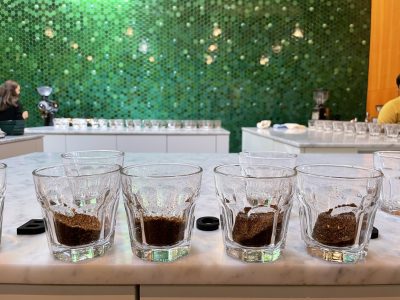Royal has a new arrival and first of its kind from long time trading partner Asociación Barillense de Agricultores (ASOBAGRI), a well established association of more than 1,200 farmers who produce coffee on small family owned farms from 80 communities within the municipality of Santa Cruz Barillas, located in the department of Huehuetenango, Guatemala.
This coffee is special for me because it comes from a youth movement growing within ASOBAGRI called Café Armonía. So I decided to interview a few of these young coffee producers about their experiences.
Please introduce yourself and provide a brief description of your work at ASOBAGRI.
My name is Manuel Walfredo Diego José and I live in Balampec, part of the Chanquejelbé village in the Municipality Nentón, Huehuetenango, Guatemala. I am the son of a coffee producer and member of Café Armonía.
How did you start working in coffee?
I started when I was younger, helping my parents pick coffee, weeding, starting coffee nurseries and fertilizing the farm.
What is your favorite part about harvesting coffee?
My favorite part is picking coffee, processing and selecting the seeds, and selectively pruning new sprouts from the coffee trees.
How has business changed over the years?
Through ASOBAGRI training and technical assistance we have changed many aspects of coffee production my community. When we started there were just a few of us but our numbers are growing and we love the work we are doing.
Can you tell us about your experience as a young person producing coffee or working with Café Armonía?
At Café Armonía, I love all the flavours we taste in the lots. I want to keep training to be an excellent barista and cupper, and an example for the next generation in my community.
Please describe a typical day for you when working at the farm or Café Armonía?
I usually work at Café Armonía on Wednesdays. This gives me an opportunity to experiment with different blends and flavors to offer a product that is from my own essence. I like to explain the combinations that I am serving to clients and I feel satisfaction when they enjoy excellent coffee.
What is the hardest part of coffee production?
Planting coffee is very costly, especially for a young person, because you don’t have a lot of money to invest in the farm and there are many steps before you actually produce coffee. You are waiting for three years for the first harvest.
What would you like roasters and consumers to know about your coffee?
I want them to recognize the quality, the flavor, the essence of my coffee, that it is a special coffee.
What would you like to know about roasters and consumers?
I want to know the profiles they like and that they trust us enough to have a long term relationship.
What is your opinion about the prices of coffee in the international market?
We offer specialty coffee and when the market price is higher we cover our costs to maintain our farms but when the market price is low we lose money and there is not enough to maintain our families so we end up in debt.
How is climate change influencing the coffee production at ASOBAGRI?
In my community there are unusually dry months (la sequilla) and this brings risks for fires. Then there are times when it rains very hard and this causes natural disasters. Now there are many times when it is much colder or hotter than normal and this is challenging for us to fight against.
Proceeds from the sale of the Los Jovenes lot are reinvested in youth programs designed to support innovation and diversification for the next generation of ASOBAGRI producers. The ASOBAGRI youth movement has been focused on improving coffee seed banks, investigating new organic technology for biofertilization, and developing barista, cupping and business skills through the Café Armonía program.




